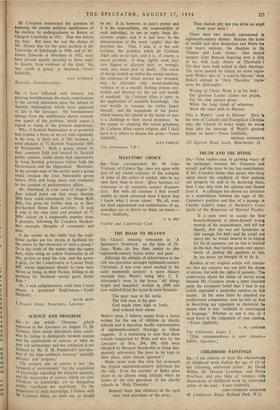THE ROAD TO HEAVEN
SIR,—Glaux's amusing comments in A Spectator's Notebook' on the lines of Dr. Isaac Watts do less than justice to this -eighteenth-century hymn writer and poet.
Although the attitude of subservience to the rich was prevalent amongst eighteenth-century Christians, it was even more marked in the early nineteenth century: a more blatant example than Watts's being Mrs. C. F. Alexander's verse in the hymn ' All things bright and beautiful, written in 1848 and now omitted from the hymn In most hymnals: The poor man in his castle The rich man at his gate God made them high or lowly And ordered their estate.
Watts's verse, I believe, comes from a hymn written for the use of children in charity schools and is therefore hardly representative of eighteenth-century theology as Glaux suggests. It is interesting to note that these schools (supported by Watts and also by the Spectator of Nos. 294, 380, 430) were attacked by Bernard Mandeville as being dan- gerously subversive; 'the poor to be kept in their place, must remain ignorant 1
Watts never took this view but possessed the typical eighteenth-century deference for the rich. Even the acerbity of Blake gives place to an almost smug attitude when he writes of the rich guardians of the charity schools in Holy Thursday ': Beneath them [the children] sit the aged men, wise guardians of the poor;
Then cherish pity lest you drive an angel from your door l There were two strands represented in eighteenth-century dissent: Bunyan the hater of wealth and class distinction and Watts the rich man's minister, the chaplain to Sir Thomas and Lady Abney. One cannot imagine John Bunyan lingering over a dish of tea with Lady Abney at Theobalds I; Yet they were both united in their theology. The verse quoted by Glaux no more repre- sents Watts's idea of ' a road to Heaven' thaq Blake's attitude in ' Holy Thursday' repro+ sents his philosophy.
Writing of Christ, Watts is at his best: Our glorious Leader claims our praise, For his own pattern given; While the long cloud of witnesses, Show the same path to Heaven.
This is Watts's road to Heaven.' Here 1+ the note of Catholic and Evangelical Christian nity; the Church of today might do worm, than take the message of Watts's greatest hymns to hcart.—Yours faithfully,
MICHAEL TOWNSEND 113 Egerton Road South, Manchester, 24


































 Previous page
Previous page